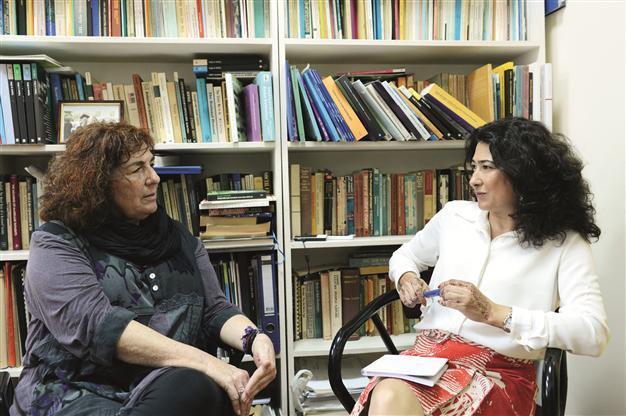Peace raised hopes of families but not much changed for kids

The PKK’s presence has had a liberalizing effect on women but with its withdrawal amid the peace process, there has been a reversal as far as women’s rights are concerned, says Nükhet Sirman. HÜRRİYET photos, Levent KULU
Families whose children have joined the outlawed Kurdistan Workers’ Party (PKK) have seen a window of opportunity for change due to the peace process, prompting them to raise their voices to get their kids back, according to Nükhet Sirman, a professor of anthropology at Boğaziçi University.The hope for change, however, is absent from the younger generations who opt to go to the mountains, as current circumstances have not changed for them, said Sirman, a member of Women for Peace, an initiative aiming to involve women in the peace process.
What is your take on the recent development about the ‘youth on the mountains?’ The state says they have been kidnapped, which is denied by the PKK. Yet, it is the first time we see mothers staging protests to get their children back.
I was doing field work in Mersin in 2010 in Kurdish neighborhoods. During the semester break, 134 kids from Mersin went to the mountains. I was sitting in a house one day visiting a family and suddenly there was a commotion; they said ‘we can’t find Fırat.’ Immediately, people thought he had joined the PKK. Two days later, he turned out to be in Istanbul. He failed an exam and out of fear of his father, he ran away.
What this shows is families are always afraid of this happening, and kids go all of the time. They have been going for 30 years. Why the families are talking about it now is because of the peace process. The possibility of peace has made this possible to begin with. I was talking to this young man; his school days were full of clashes. He said when you are at school, all of the youth have to make the decision: ‘Do I go or do I stay?’
I personally don’t believe the PKK has kidnapped anybody. There are doubts raised as to whether the kids in the latest case have the necessary mental maturity. These children, a lot of them in Mersin and Diyarbakır, work in terrible conditions from about when they reach 9 or 10. It’s ridiculous to say they have been duped into going. These kids fight the police every single day. They live in a different world. What kind of a life are these kids offered that they should not go to the mountains? What is their future? Are they going to be able to go to university; how many of them will be able to graduate from high school?
If families don’t want their children in the mountains, why did they not raise their voices earlier?
Who could they raise their voices to in the middle of the war? There was no such possibility. They have always wanted their children back. At the moment, there is no fighting. It is easier to make such calls with the cease-fire.
What happened is a youth who came back was sentenced to 47 years’ imprisonment in court. When you see this, if my child wanted to come down from the mountains, I would go to the police and say my son was kidnapped to save him from imprisonment. If there is no law to allow these kids to be reabsorbed into society, they are going to say their kids are kidnapped. These calls are coming now because parents have hopes for change; they found a window of opportunity.
One would expect the number of those going to the mountains to decrease during peace process. But it seems this is not the case.
Not at all. The number is estimated to be around 2,000 since the process started. To begin with, there is a cease-fire, but nothing is concrete. The current reality has not changed for the youth; the humiliations they suffer in the cities continue. Poverty is a very important problem as well. They don’t see a future for themselves.
The peace process has not changed much for the youth, whereas for the parents it has created a kind of hope?
Yes, absolutely.
Where do you think the peace process is at this stage?
What we find about peace processes is these processes all over the world take a very long time to come about, to be established. It seems on average a peace process is reversed five times before it finally works.
The good thing about this process is the cease-fire has continued, come what may. Nobody has gone to actually firing arms. Nobody seems to be working on that. It says both the Turkish government and the PKK are committed to the cease-fire and that is very good.
Peace processes have to be legalized; they have to be transparent and socially desired; they have to be socialized, otherwise they don’t get established. Otherwise, there is failure. The other thing that spells failure is the inability to take women’s grievances into account. Peace processes are not successful when women’s grievances are not taken into account. Women’s bodies end up like a battlefield; what is being battered is not just their body, but their soul, too.
Their souls need to be repaired. Unless they are repaired, neither men nor women feel vindicated. What we have also found is women are not always on the losing side, as they also become very strong. The PKK has as many women as it has men, and the women will not go back home to baking bread again.
The liberalizing effect on Kurdish women
Last year in Lice, women told us the PKK was not simply a force fighting the Turkish army, but a force supporting women in their everyday lives. A woman said, ‘As long as my daughter is up there with her gun, I am strong here.’ The presence of the PKK there was a force regulating social relationships.
There were fewer thefts and almost no fights for land. When the PKK began to retreat, we began to hear stories in Lice about people fighting for land. In Doğubeyazıt, their husbands began to say ‘Do you have to go to the party so often? Why don’t you stay at home and look after the children?’ The PKK is a force protecting women’s rights.
So you suggest there has been a regression in women’s rights due to the withdrawal of the PKK?
The retreat changed the relationship between the armed forces and the locals. Before, the armed forces could not penetrate the capillaries of everyday life; they would stay in their barracks and be less visible. Now they have started to get out. What this means is the harassment of women. They are building these tall buildings called ‘kalekols.’ A woman told us, ‘When we would go to work in our garden, my husband would say go work under the trees. Even this is now impossible; they can watch us work.’ We have heard a lot of stories about the kalekols. People sleep on their roofs; how can they sleep when they have a kalekol on the top, looking over? People in Tunceli and in Lice said these kalekols disturb them.
So the peace process has its contradictory currents, positive and negative.
Of course; that’s normal. It’s something we have seen happen in most peace processes. That’s why there are so many reversals. They get broken apart and have to restart. And this is what is happening in Turkey.
What are your warnings regarding the peace process?
The first thing is: security measures need to be humanitarian and gender-sensitive. Don’t build your kalekols so soldiers can gawk at the women and provide ground for new tensions. If the PKK is retreating, you have to reduce the number of security personnel, not increase them.
Allowing women to speak in Kurdish is a gender-sensitive security measure. Legalizing all of the steps that have been taken is another issue. At the moment, the MİT now has a law that legitimizes their activities, but no one else.
We need to have a truth commission established; a truth commission that looks into war crimes. Impunity is one of the biggest problems that stops vindication from taking place.
Who is Nükhet Sirman

Nükhet Sirman is professor of anthropology in the Department of Sociology at Boğaziçi University. She has worked on women and family farms in cotton production in Turkey, on the feminist movement in Turkey and on various aspects of gender and nationalism.
Sirman is a co-editor of a volume entitled “Turkish State, Turkish Society” and has written many articles on love and nationalism, women’s life stories, gender and citizenship.
She recently completed research among migrant Kurds in the southern province of Mersin and is preparing a book on the making of a life after forced migration. As a feminist, she has worked for the Women’s Library, KADER (an NGO working to increase the numbers of women in Parliament), and is now a member of the Women for Peace Initiative.
















